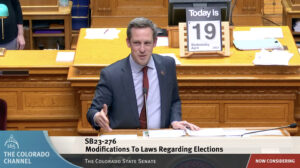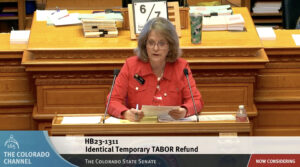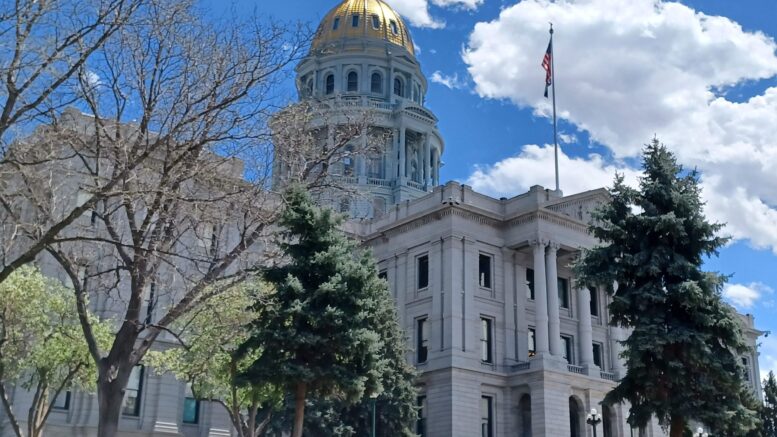When Republicans and Democrats gather at 9 a.m. today for a special session focused on property-tax relief, they will present proposals that have wide gaps in policy — and that ultimately are unlikely to offer further help to owners of commercial properties.
Following defeat of their Proposition HH by voters last week, majority legislative Democrats will offer a bill featuring a scaled-down version of the plan that cuts property valuations and assessment rates for homes and apartment buildings but not for nonresidential properties. Separate bills will seek to offer an additional $35 million in rental assistance, expand the Earned Income Tax Credit and equalize all Taxpayer’s Bill of Rights refunds next year rather than send larger refunds to Coloradans who earned more and paid more in income tax.
Republicans, meanwhile, will focus their efforts on bills that would offer greater cuts in property valuations and assessment rates than Prop HH offered, while also setting up a task force to study long-term reform of the state’s property-tax system. Both the House and Senate versions of those bills include a provision to cut the valuation of most nonresidential property from 27.9% to 25.2% and to reduce the value of all such properties by $60,000.
Amidst this, Colorado Concern on Thursday announced plans to get an initiative onto the 2024 ballot that would revert commercial and residential property values to 2020 levels that don’t reflect the post-pandemic real-estate boom and limit growth in valuation to 2.5% annually. That comes as fiscally conservative policy group Advance Colorado already has gotten approval for a ballot initiative next year that would set a 4% annual cap on property-tax bill increases.
Areas of compromise in special session?
While the competing ideas theoretically set up a debate on big policy differences, the sizable Democratic majority at the Capitol — the party holds advantages of 46-19 in the House and 23-12 in the Senate — means the GOP has work to do just to get any of its ideas into the final bill. House Minority Leader Mike Lynch, R-Wellington, said he will fight specifically for the bigger cut in residential assessment ratios his bill proposes — down from 6.765% to 6.5%, rather than the 6.7% offered by Democrats — and a task force makeup with more business representation.

Mike Lynch is the Colorado House minority leader.
“Nobody’s going to end up being happy,” Lynch predicted. “I’m not optimistic for a bipartisan answer coming out of this.”
In addition to the reduction in residential assessment ratio, the primary Democratic bill, which will be sponsored by Senate President Steve Fenberg of Boulder and Sen. Chris Hansen of Denver, would cut property valuations by $50,000 for the 2023 tax year only. A 2022 law already allows for $15,000 valuation reductions, but the extra cut in that area will be able to help middle- and lower-income homeowners and “people who are most in need at this moment,” Fenberg said during a news conference on Thursday.
The bill would use $200,000 that had been set aside to fund Prop HH had it passed to backfill revenues given up by local governments due to the one-time tax cuts. That’s enough to fully fund losses by school districts and fire districts across the state, as well as special districts and other local governments whose property-tax revenues less than 13.5%, Fenberg explained.
No relief for commercial buildings
It would not, however, grant further tax breaks to nonresidential properties, even as groups like NAIOP Colorado noted that commercial buildings in most of the state are seeing skyrocketing property-tax bills, while those in some urban areas struggle with high vacancy rates. House Speaker Julie McCluskie, D-Dillon, said Thursday that a 2022 law already puts into place a reduction in assessment rates from 29% down to 27.9% this year for nonresidential properties other than oil and gas, agriculture and renewable-energy-producing properties.
“To be honest, this is one big math problem,” Fenberg said. “We are trying to provide the reset we can, given the restraints of backfill.”

Senate President Steve Fenberg speaks on the chamber floor during the 2023 regular legislative session.
Republicans, in addition to cutting the assessment ratio to 6.5% for the 2023 year and giving breaks to nonresidential properties, propose reducing residential property valuations by $80,000. The property-tax reduction in the GOP plans would equate to $1.37 billion at a time when the state has estimated total property-tax collections will go up by nearly $4 billion due to skyrocketing property values — a total small enough that it would represent only a reduction in the rise of collections rather than an overall reduction in bills, Sen. Barbara Kirkmeyer noted.
Kerfuffle over proposals for special session
Fenberg called the GOP plan, which would dip into the state’s budget reserves to backfill some money lost by local governments, “not a real proposal that is meant to be enacted.” In the event of a recession, that dip in reserves could lead to cuts in other areas such as schools, he said.
Kirkmeyer, a Brighton Republican, responded that the reserves are there for just such emergencies as this spike in property-tax bills, which will average about 40% statewide.
“What’s not right is for the state gov to be sitting on $2.3B in reserves, the equivalent of a savings account, while Coloradans are struggling to make ends meet, going into debt and depleting their savings,” she said in an email to The Sum & Substance. “We all need to tell the Democrats to get real — and give Coloradans meaningful, honest tax relief.”

State Sen. Barbara Kirkmeyer speaks in the Senate earlier this year on a bill to equalize TABOR refunds to all recipients.
Republican bills propose a 23-member task force to examine long-term property-tax relief, which includes five non-voting members appointed by Colorado Concern, the Colorado Apartment Association, the Colorado Chamber of Commerce, the Building Owners and Managers Association International and the Commercial Real Estate Development Association. Democrats also are expected to propose a long-term task force, but they have yet to discuss how they would like to apportion its membership.
The newest looming ballot initiative
Watching all this closely will be Colorado Concern CEO Mike Kopp, who said he hopes that whatever comes from the Legislature will give meaningful tax relief to residents on fixed incomes now facing the possibility of tax bills rising by hundreds of dollars each month. But Kopp also believes more needs to be done on a systemic basis, which is the reason that his group announced its plans Thursday to run the ballot initiative.
Under the proposal, residential and commercial property values would reset to 2020 levels unless the property has been sold since then or undergone substantial improvements that added square footage to buildings. In those cases, assessments made after the 2021 tax year would serve as the new baseline for property taxes.
Once reset, actual value for real property would not rise on an annual basis by more than the cost of inflation, and that rise could not exceed 2.5%, according to the proposal. This would offer predictability for both homeowners and small-business owners who also own their property, and it would guard against the painful price shocks that came with a uniquely hot real-estate market after the start of the pandemic, Kopp said.
“We’re very worried about the erosion not just of family budgets but of small-business budgets,” he said, noting that even storeowners who rent their space are having the huge spikes in property values passed along to them by landlords.
The special session must last for at least three days — the minimal amount of time it takes legislators to pass bills through both chambers. It’s unlikely to go much longer than that, if at all, as the Thanksgiving holiday looms, as does the deadline for county assessors to prepare the property-tax bills that legislators are looking to reduce.
